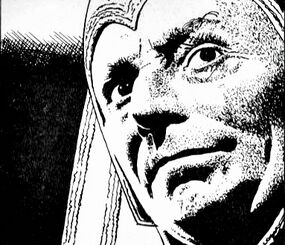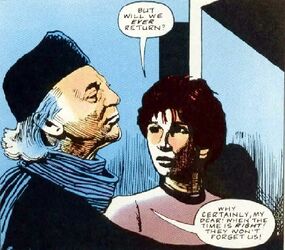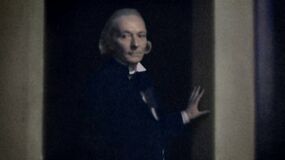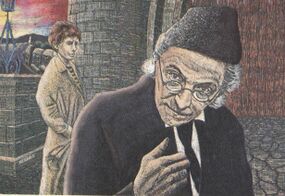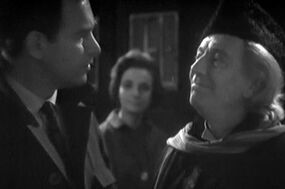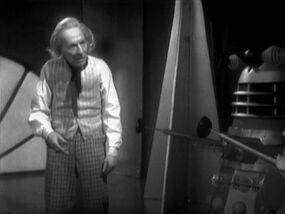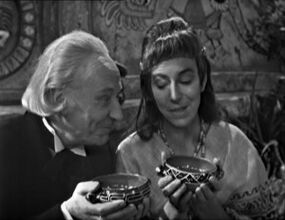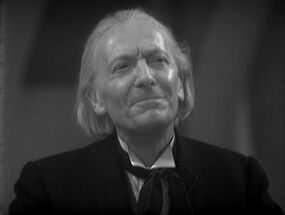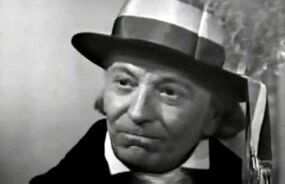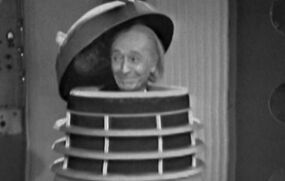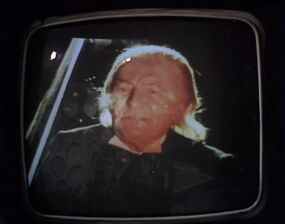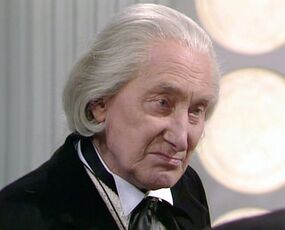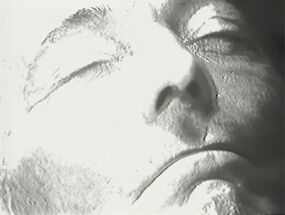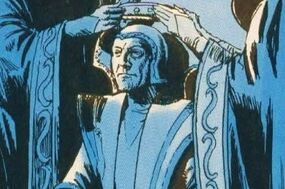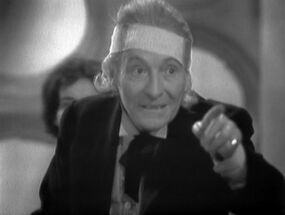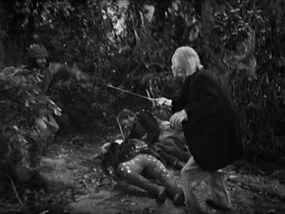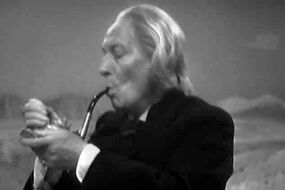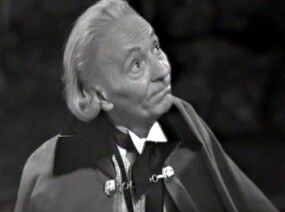First Doctor
Info from all the First Doctor lost stories and several companion chronicles needs to be added.
These omissions are so great that the article's factual accuracy has been compromised. Check out the discussion page and revision history for further clues about what needs to be updated in this article.
The First Doctor was, by his own statement, the "original" incarnation of the Doctor. (TV: The Five Doctors) He held himself in high regard, and was prone to criticise those whom he felt were naive or primitive compared to his intellect. However, he possessed compassion, warmth, and wit that made up for his egocentric nature, serving to act as a mentor and guardian figure in his elderly years. Originally a very difficult and curmudgeonly person, the First Doctor matured from an apparent selfishness and became more inviting. His happier, kinder characteristics fostered when he began to acquire an entourage of companions to accompany him throughout the wonders of the fourth dimension and learned to be a caregiver with a sense of justice in a universe afflicted by evils.
Beginning after he fled his homeworld of Gallifrey, his travels through time and space were mostly random owing to faulty components in his TARDIS. (PROSE: Time and Relative, TV: The Name of the Doctor) Initially, he travelled only with his granddaughter Susan Foreman. They settled for a time on Earth in 1963, where Susan was a student at Coal Hill School. He was forced to abruptly depart from Earth with Susan's teachers Ian Chesterton and Barbara Wright, kidnapping them from their own time after they went to investigate their unusual pupil. (TV: An Unearthly Child) After much travel with Ian and Barbara, he bade Susan farewell to allow her to live a happier life with a man with whom she had fallen in love. (TV: The Dalek Invasion of Earth)
Following Susan's departure, the Doctor travelled for a short time with Ian and Barbara, before happening upon the planet Dido, a planet he knew from previous journeys. Here, he invited a new travelling companion to join him, Vicki. She reminded him of Susan, and the Doctor saw her as a surrogate to fill her spot in his travels with Ian and Barbara. (TV: The Rescue) Later, during a confrontation with the Daleks, the Doctor used one of their time machines to return Ian and Barbara to their proper time - something he had been unable to manage with his TARDIS. (TV: The Chase) Vicki eventually left the Doctor's company as well, also after falling in love with a man she met on one of their travels. (TV: The Myth Makers)
Soon after the departure of Ian and Barbara, the Doctor and Vicki had gained a new companion in Steven Taylor, with whom the Doctor had a relatively uneasy relationship. Steven soon became bitter towards him, blaming him for the several deaths of their travelling companions; Katarina and Sara Kingdom, but eventually forgave him. They were then joined by Dodo Chaplet. Ultimately, Steven decided to stay to help a civilisation they had encountered while Dodo was injured in an adventure and decided to remain home in her own time.
Shortly before his battle with the Cybermen of Mondas in Antarctica in December 1986, the Doctor had gained two new companions in Ben Jackson and Polly Wright, to whom he was much more kind; he hoped to prevent them from leaving as Steven had. He met his end after battling the Cybermen for the first time. He was forced to regenerate into his second body from exhaustion and a loss of strength to maintain his ancient body. (TV: The Tenth Planet)
Biography
Early life
Childhood
Correct references to the Doctor's father and the Doctor's mother are to be made.
The Doctor was born on Gallifrey, home planet of the Time Lords, "the oldest and most mighty race in the universe." (TV: The War Games, The Time Warrior, The Sound of Drums, et. al) He was born under the sign of Crossed Computers, the symbol of the maternity service there. (TV: The Creature from the Pit) The infant Doctor slept in his cot under a mobile which Amy Pond later called "the Doctor's first stars." (TV: A Good Man Goes to War)
One account states that, along with his cousins, the Doctor was loomed into the House of Lungbarrow, and that he was a genetic reincarnation of the Other. (PROSE: Lungbarrow) Many other sources suggested that this was incorrect.
The Doctor stated he had parents, as well as a family and childhood. (TV: The Tomb of the Cybermen, Doctor Who, The Sound of Drums, The End of Time) A later incarnation of the Doctor once claimed that he was half-human on his mother's side. (TV: Doctor Who) His mother may have been a Victorian era human called Penelope Gate, and his father, Ulysses, may have been a Time Lord explorer. (PROSE: The Gallifrey Chronicles) However, according to one account, the Doctor expressed unfamiliarity with neither Sol nor the Earth prior to his travels in the TARDIS. (AUDIO: The Beginning) He had a brother called Irving Braxiatel. (PROSE: Tears of the Oracle)
When he was just a "small child," the Doctor's mother told him the story of Grandfather Paradox. The story scared the Doctor so much that he worried that Grandfather Paradox was hiding in his wardrobe or under his bed. (PROSE: The Gallifrey Chronicles)
For some of his childhood, the Doctor ostracised himself, going to sleep in a barn where he would weep over his fears. During this time, a man believed that the Doctor wanted to join the army, in spite of claims to the contrary by a woman who cared for him. This man believed the Doctor would not make it into the Academy and become a Time Lord. Clara Oswald, a future companion of his who had accidentally travelled into the Doctor's past, comforted him during a time of distress, assuring him that fear gave him strength. (TV: Listen) When Madame de Pompadour read his mind, she said he was "such a lonely little boy." (TV: The Girl in the Fireplace)
As a child, he had an imaginary friend named Binker. (AUDIO: The Abandoned)
On "the blackest day of his life," the Doctor claimed that as a little boy, he went to visit a hermit on the side of the mountain his family's house rested on in Southern Gallifrey. While climbing the mountain, the young Doctor saw only dull colored rocks and weeds. However, the Hermit gave no words of advice when he heard the Doctor tell him all his troubles, but instead pointed at a flower, which the Doctor had dismissed as a weed. As he descended the mountain, the world no longer seemed so grim and the Doctor noticed the colors of the rocks and the vibrancy of life in the flowers; his hope restored. (TV: The Time Monster) This hermit would also tell him ghost stories about the King Vampire. (TV: State of Decay)
The Doctor wanted to be an explorer when he was young, but because the Time Lords had already explored every time and place, the Doctor didn't believe there was any point to him becoming an explorer too. He then found a reason and whenever he felt hopeless, he remembered that reason. (PROSE: The Frozen Wastes)
In his childhood, the Doctor once watched a meteor storm on Gallifrey with his father. (TV: Doctor Who) At the age of eight, the Doctor was taken from his family and stared into the Untempered Schism as part of a Time Lord initiation rite. He reacted by running away. (TV: The Sound of Drums)
As a later incarnation of the Master recalled, he and the Doctor were close friends, and used to play in the estates of the Master's father by Mount Perdition for days long during their childhood. (TV: The End of Time) The Master would often hypnotise others, and the Doctor would un-hypnotise them, even though it was the Master who taught the Doctor hypnotism. (PROSE: The Dark Path) The Doctor and the Master were bullied as children and the Doctor was forced to kill the bully Torvic to save his friend's life. He was later confronted by Death, who insisted he become her disciple. The Doctor refused and asked for Death to take away his guilt, causing her to transfer the memory of committing the crime to the Master instead. The Doctor forgot he had ever made the deal. (AUDIO: Master)
He was also bullied by Anzor, who used a device called "the galvaniser" (a torture device) on his classmates to ensure that they did as he said. He particularly bullied the Doctor, forcing him to do his navigational homework as he was too stupid to do it himself. He used the galvaniser on the Doctor at least once, as he later threatened to "revive your memory of my galvaniser" to terrify him. (AUDIO: Mission to Magnus)
The Doctor once claimed that he was considered "quite a looker" in his youth. (PROSE: The Plotters)
Academic career
He attended the Time Lord Academy under the tutelage of Borusa and was a member of the Prydonian Chapter. (TV: The Deadly Assassin) The Master was one of his classmates. (TV: The Five Doctors, et al) The Doctor did not have an impressive career at school, passing his qualifying exams to become a Time Lord with only 51% — the lowest possible pass mark — on the second attempt. (TV: The Ribos Operation) However, this was revealed to be indirectly influenced by his brother, Braxiatel. The Doctor was jealous of his freedom to leave Gallifrey as an unofficial ambassador, and tried to follow the route that he had taken, but he was too impatient. He also realised that with Braxiatel already out in the universe, the Time Lords would not allow anyone else to go. Therefore, he deliberately scraped through the Academy with the bare minimum marks on the last permitted attempt, so as not to draw undue attention to himself, so he could eventually leave Gallifrey. (PROSE: Tears of the Oracle)
During his first year at the Academy, the Doctor gained a troublesome reputation by trapping his teacher in a time-loop for a day. (PROSE: Island of Death)
During his time at the Academy, the Doctor "mucked about" with space-time portals, something he later indicated were easy to create. (PROSE: Made of Steel)
The Doctor left the Gallifreyan equivalent of primary school aged forty-five. (PROSE: Shroud of Sorrow)
Still a "small boy", the Doctor wrote a treatise on the chromosomal origins of love. His tutor said that he missed the point entirely and gave him a "rubbish" grade. (AUDIO: The Wormery)
When he was ninety, he visited the Medusa Cascade, later describing himself as "just a kid". (TV: The Stolen Earth) The Eighth Doctor stated that he was a terror until the age of 120, claiming that he was a late developer. (AUDIO: The Next Life)
At the Academy, he and the Master joined the Academy's Hot 5 musical band, with the Doctor playing the lead perigosto whilst the Master played the drums. (PROSE: Deadly Reunion) He once attended a party on the Moon of Korpal and met fellow academy student, Rummas, but was too drunk to remember. Soon after, he and Rummas began sharing Borusa as a tutor. (PROSE: Spiral Scratch)
On one occasion, he and the Master travelled into Gallifrey's history in search of Valdemar a dark mass of life created by the Old Ones in the higher dimensions, which swept across creation and wiped out the Old Ones. They met a surviving Old One, who warned them of Valdermar's powers. The Doctor was shaken and was horrified that the Master seemed fascinated by its power. (PROSE: Tomb of Valdemar)
While at the Academy, the Doctor rode Vortisaurs bareback and was proficient in handling them. (AUDIO: Storm Warning)
In the years spent at the Academy, the Doctor belonged to a clique of ten young Time Lords with the collective name of the Deca, a group which included his friends the Master, who then went by the name of Koschei, and Ushas, later known as the Rani, who would both become his enemies centuries later. (PROSE: Divided Loyalties) The Doctor spent "centuries" at the Academy. (COMIC: Mortal Beloved) While he was at the Academy, the Doctor received the nickname "Theta Sigma" or "Thete" from his friends in the Deca. He wasn't always fond of this nickname. (TV: The Armageddon Factor, The Happiness Patrol)
He was expelled for a time and relegated to traffic control for five centuries after his first encounter with the Celestial Toymaker in an act of youthful rebellion resulted in the "deaths" of his friends Rallon and Millennia, but he returned to the Academy after receiving his doctorate in his spare time. (PROSE: Divided Loyalties)
In year fifty at the Academy, the Doctor fed a snapping wart fowl to his fellow student Valyes' summer project. Valyes held a grudge against him after that. (AUDIO: The Next Life)
The Doctor failed his time-travel proficiency lesson because he didn't attend it, which made him unqualified to operate a TARDIS, and he also rejected an offer to retake the lesson. (PROSE: Festival of Death)
The Doctor earned a Higher-Dimensional Physics degree at "Time Lord University." He was required to learn how to envision a superimposed array of 208 different 43-dimensional supersolids and it took him about eight years to master the skill. (COMIC: The Friendly Place)
The Doctor was a father at one point in his life, (TV: Fear Her, Listen) of both "sons and daughters". (PROSE: The Eleventh Tiger) The Doctor had three grandchildren, Susan, John and Gillian, although John and Gillian were living on Earth and had no knowledge of him or their true origins. (TV: An Unearthly Child, COMIC: The Klepton Parasites)
Sometime later in his life, the Doctor was considered a "superior" on Gallifrey. On one instance, he saved a glowing life form from being killed by other Gallifreyans, including his old friend Magnus, later known as the War Chief. (COMIC: Flashback)
The Doctor later met and rescued Patience, the wife of Omega, co-founder of the Time Lord society, along with her granddaughter. (PROSE: Cold Fusion)
Before leaving Gallifrey, the Doctor learned of the existence of the miniscopes and was outraged by their cruelty to the specimens within. He campaigned to have them banned and, despite the non-interference policy of the Time Lords, was successful. His role in banning the use of miniscopes was known throughout nine galaxies. (TV: Carnival of Monsters, PROSE: The Empire of Glass)
Before he departed from Gallifrey, the Doctor possessed a Type 50 TARDIS, which he abandoned when he left and became a renegade. (AUDIO: Prisoners of Fate)
Leaving Gallifrey
Several versions of the Doctor's departure from Gallifrey were known.
One account depicted the Doctor living as a lowly Scrutationary Archivist of the Bureau of Possible Events, and disowned by his family in the House of Lungbarrow. In order to replace the disowned Doctor, his family loomed another cousin, Owis. After an encounter with a gloating Glospin, he revealed that there was genetic evidence to suggest that the Doctor didn't originally come from the Lungbarrow Loom, and intended to use it to get the Doctor executed for Loom-jumping. During a fight between the two, the Hand of Omega arrived to attack Glospin, giving the Doctor the opportunity to escape in a Type 40 TARDIS with the Hand of Omega.
The Hand piloted the TARDIS to the Dark Time on Gallifrey to collect Susan, who was the granddaughter of the Other. Susan believed the Doctor was a reincarnation of the Other, and began travelling the universe with him. (PROSE: Lungbarrow, Nightshade)
Another account presented the Doctor existing during a period of civil unrest on Gallifrey, when many students of the Time Lord Academy led by Koschei, revolted against the corrupt Lord President Pundat the Third, and attempted to recruit the Doctor and convince him to take the position as President, but decided not to interfere with the current constitution. When Pundat died of stress soon after the revolt, his chosen successor was Chancellor Slann. The students had found the last of Lord Rassilon’s descendants, Lady Larn, a seven-year old child adopted by Councillor Brolin. They decided on a second coup. Yet in trying to convert the Doctor, the students were overheard.
The Doctor, innocent of the students' revolt, was too highly respected to be terminated like the other students. It was decided to wipe parts of his memory. Bloody reprisals against the students followed, and the Doctor decided to leave Gallifrey in a TARDIS. As it happened, the Lady Larn was hiding in the same TARDIS that the Doctor stole; the Doctor knew her as Susan and she affectionately called him "grandfather". (PROSE: Birth of a Renegade, COMIC: Time & Time Again)
Another account suggests the Doctor broke the Time Lords' law on non-interference and faced being erased from history by his brother Braxiatel. Braxiatel allowed the Doctor to run, giving him the chance to steal a Type 40 TARDIS and escape Gallifrey. He took with him the Hand of Omega and his granddaughter, Susan. (AUDIO: Disassembled)
One account showed the Doctor, already with Susan, ready to steal a faulty TARDIS in a repair shop on Gallifrey. (TV: The Name of the Doctor, AUDIO: The Beginning)
The Doctor had brought the flying trunk containing the Hand of Omega with him and Susan had brought basic luggage from her house. Armed guards chased the fugitive Doctor and Susan into the repair shop, where the only place for them to hide was a line of TARDISes. Susan walked into one TARDIS, but the Doctor didn't follow her inside. After Susan heard voices outside, the Doctor urged her to go inside the cylinder next to it instead. (AUDIO: The Beginning) The Doctor was being advised by a version of Clara Oswald to steal the Type 40 with a faulty navigation system instead of the one Susan had walked inside, as it would be much more fun. This account also showed the Doctor already wearing Victorian era dress before he visited Earth. (TV: The Name of the Doctor) The Doctor speculated that the TARDIS was deregistered, and that was how it slipped through Gallifrey's transduction barrier and how they evaded the Time Lords. (AUDIO: The Beginning)
He grew a bond with this TARDIS that would last for centuries. When the Doctor first entered the TARDIS, he described it as "the most beautiful thing I ever saw". (TV: The Doctor's Wife)
The beginning
One account cited the Doctor and Susan already went by these names when they left Gallifrey. (AUDIO: The Beginning)
According to one account, immediately after leaving Gallifrey, the Doctor rested in the TARDIS console room, while Susan explored their new home. She found a full-length mirror, and saw a pale-skinned fanged figure who vanished after telling her that she was not the one. The Doctor theorised that, since they were now travelling through time, she encountered a brief echo of another era, an event from either the future or the past. (PROSE: The Exiles)
According to another account, Susan collapsed shortly after the engines were stabilised. The Doctor tended to Susan as she slept, and used his jacket as a makeshift pillow for her before she reawakened. Susan then explored the TARDIS as the Doctor tended to the ship's controls. She tripped over a rigger's work case and brought it back to the Doctor when the TARDIS had run out of power. Inside the work case, the Doctor found an artron cell and attached it to the drive system to power an emergency landing. After finding a nearby world, the TARDIS appeared to take over and brought them to the Moon. (AUDIO: The Beginning)
According to one account, the Doctor and Susan's first destination was a vivarium beneath the surface of the Moon. Before walking outside, they were confronted by Quadrigger Stoyn, who had become an unwitting passenger and had part of his face burned when the TARDIS took off. Stoyn's job was to take apart the TARDIS' engines before it was sent to be vaporised, but the TARDIS had run out of power, stranding them. The Doctor took the dematerialisation circuit so Stoyn wouldn't leave them behind and they explored the strange location. The Doctor, Susan and Stoyn were taken out of the tank and realised they were in a massive cavern filled with vivariums carefully-preserved specimens. The Archaeons had been seeding primitive planets such as the Earth with life by firing red lightning from the Moon, creating an established order out of the chaos and nurturing the early lifeforms under controlled conditions.
While checking to see if the TARDIS was a threat, the Archaeons began taking it apart. They took the TARDIS' temporal stasis capacitor while it was still attached to the power source. This caused the stasis field to breach, freezing the Doctor, Susan, Stoyn and the Archaeons in time, allowing the TARDIS to recharge itself. 450 million years later, humans had evolved on the Earth until they established a lunar colony, Giant Leap Base. A group of humans from Giant Leap Base broke the stasis field, taking the Doctor and Susan on board their lunar rover, where they came to.
According to this account, the Doctor and Susan learnt about the Earth's history through a "first contact induction video" Susan had been provided while on board the rover. With the dematerialisation circuit still in the Doctor's possession, the Archaeons had sent nematodes, which didn't affect the Time Lords, to kill all of the humans on the rover. When the Archaeons, found the life they had "seeded" had become disorderly and "run rampant", no longer matching their carefully-planned vision, they "purged" the humans on the lunar base and on the Earth with lightning. The Doctor, who was blamed for the disruption of the Archaeons' experiments, was brought back to the cavern. Meanwhile, the humans retaliated against the Archaeons with missiles. After the Doctor went inside the TARDIS, evading the distracted Archaeons, Stoyn tried taking Susan with him, but she refused and ran inside the TARDIS.
With the dematerialisation circuit in place, the Doctor and Susan left without Stoyn, as the Doctor felt that he was just as willing to abandon them. Another barrage of missiles breached the atmosphere of the Archaeons' cavern, destroying their weaponry; the Archaeons were pulled outside, though Susan saw Stoyn struggle to reach the rover. Afterwards, the Doctor continuously watched the video about the Earth's history and evolution inside the TARDIS, marvelling at the planet's abundance. He promised it would be his next destination. Instead, his next stop was a place with a blue sun and air like wine. It took several trips before he reached the Earth again. (AUDIO: The Beginning)
According to one account, the Doctor met humans for the first time on the planet Iwa when he and Susan were separated. In his search for Susan, the Doctor found a human medical colony. The principal work of the facility, called "the Refuge", was to rehabilitate patients identified as "Future Deviants". By undergoing dream therapy, it was hoped that such individuals would not become criminals. The Doctor soon learned the residents were besieged by fox-like aliens who could disintegrate and reconstitute their bodies.
Taking him inside their compound, the humans stripped him of his clothes and burned them, citing possible contamination by the "foxes". They gave him new clothes drawn from their own supply. This meant that he was now wearing the garb of a doctor. When they assumed that he was sent by Earth to help them, he agreed. Not wishing to give them his real name, he referenced his new clothes to derive a title: "the Doctor". The Doctor assumed this alias, because he described it as an honourable profession amongst his own people.
He agreed to help them with their "fox problem" if they would help him find his granddaughter. They discovered "Susan" had become trapped in the colonists' "dream chambers", medical devices that put patients into deep sleep and linked them in one communal dream. Inside the dream chamber, the Doctor's granddaughter met a human colonist named Jill, who promptly gave the young girl the name "Susan", after Jill's own mother.
Eventually the newly-named Doctor and Susan were reunited. They helped the colonists broker an uneasy peace with the foxes. They left the colony, deciding to retain the names they had gained there. The Doctor was deeply impressed by humans during this initial encounter. He told Susan they should find a way to settle amongst them for a while, so that he could study them and they could maintain a low profile on the run from the Time Lords. (PROSE: Frayed)
Some time after their first meeting with humans, the Doctor and his granddaughter began to study Earth and humans more closely. Revolutionary-era France was the site of the Doctor and Susan's first-ever visit to Earth. (PROSE: Just War) Later, while attending Coal Hill School in 1963, Barbara Wright lent Susan a book called The French Revolution, in which Susan noted several historical inaccuracies. (TV: An Unearthly Child)
One of their first trips to Earth was to the British coastal town of Keelmouth in 1933. There, they vacationed at a bed and breakfast called "Bide-a-Wee". Another of its guests was a time traveller named Prentice. He had used his technology to displace Keelmouth in time; the village was in 1933, but the surrounding world was in 1999. The Doctor and Susan had to convince Prentice to reverse the effect, because his retirement fantasy wasn't fair to the people he had trapped alongside him. (PROSE: Bide-a-Wee)
Continuing his TARDIS travels with Susan, the Doctor began pursuing the Soul Pirates, after they had removed and stolen his hand in a sword fight. Whilst following them, they arrived in 1900 London, where Susan and a group of children were kidnapped, so the Soul Pirates could harvest their body parts for a profit. However, the Doctor foiled this plan, and rescued Susan and the children. According to this account, the Doctor first wore his Victorian style outfit, and received a brand new hand, indistinguishable from the original. (PROSE: A Big Hand for the Doctor)
The Doctor first encountered Brigadier-Lethbridge Stewart, one of his closest and oldest friends in the future, at Christmas when he and his wife Doris saved Susan from drowning. However, the Doctor seemed to know how important the Brigadier would become to him, and told Doris that he knew how his future friend would die. But promptly left before distruption to their personal timelines. (PROSE: The Gift)
The Doctor and Susan went to ancient Rome, Mexico, Antioch, Jerusalem (PROSE: Byzantium!) and Akhaten. (TV: The Rings of Akhaten)
On further adventures, they sailed around the Carribean onboard a pirate galleon, witnessed the assassination of President McKinley, travelled to Cassuragi and visited Mondas and encountered Cybermen for the first time. (PROSE: Byzantium!)
The Doctor and Susan next visited Jabalhabad, India, in 1843, whilst they were touring India by elephant. They met Siger Holmes, father of Sherlock Holmes. (PROSE: All-Consuming Fire)
After landing in Germany in the sixteenth century, the Doctor and Susan teamed up with magistrate Rudolf von Slesinger and an inquisitor called Johann Eck to protect Martin Luther from two assassins ahead of his trial. Instantly suspicious of Slesinger's odd behavior, the Doctor sent Susan undercover as a servant girl and discovered he had manipulated events and had deployed the assassins in a plot to kill Martin in secret. Before he could kill both the Doctor and Martin, Slesinger was apprehended by Eck. Afterwards, the Doctor and Susan decided to remain in Germany for the trial of Martin Luther. (PROSE: The Price of Conviction)
Not long after, they accidentally landed at the BBC's Paris studios in 1955 because transmissions there had disabled their dematerialisation circuit. They met a radio comedian named Max Wheeler, the star of a program called Anyway, As I Say. His recordings were plagued by a distinctive background "hum" caused by ghostly aliens known as the Shakers. These aliens could kill people with sonic resonance — the thing manifesting itself as a "hum" on BBC broadcasts. During World War II, the British saw the Shakers as a useful ally. They recruited the Shakers into the French resistance. The Doctor learnt the Shakers were unaware that the war had ended and were unable to clearly understand who their enemies were. Unfortunately, the audiences laughter during the performance of Anyway As I Say was, because of its precise harmonics, resonating them out of their "homes" in the walls of Broadcasting House, reawakening them to their murderous task. The Doctor and Susan used canned laugh tracks to force the Shakers out of the walls. Though he and his granddaughter tried to explain the current reality to them, the Shakers continued to kill indiscriminately. The only course of action was for Susan and the Doctor to alter the harmonics of the canned laughter and kill them with it at a last resort. (PROSE: Losing the Audience)
The Doctor accepted a psychic invitation to be a guest speaker at a Time Conference on Refkeet Nine and raged against the local authorities when he discovered he had been lured into a trap so that they could use an abused Nuppino horse to teach him a lesson about his time travelling escapades. Whilst he dealt with this, the Doctor was oblivious to the fact that his eleventh incarnation and Clara Oswald had also accepted the invitation and had been watching events unfold. (COMIC: Time Trick)
The Doctor and Susan also met Noel Coward. (AUDIO: The Sleeping City)
Visiting Earth again in 1979, the dematerialisation circuit was fried while the TARDIS was orbiting Earth. The TARDIS was taken on-board a Slarvian transport, and the two Time Lords learned that the snail-like species planned to conquer Earth by hatching their eggs all over the planet. Their plan failed because the Slarvian ship crashed into the English Channel, making the threat localised to England. With the help of the humans Linda Grainger and her grandfather Edward Grainger, who had met the Doctor many times in his future incarnations although the Doctor was yet to meet him, the Doctor and Susan stopped the Slarvian eggs from hatching. (PROSE: Childhood Living)
Soon after, they unwittingly travelled to Paris in the 22nd century, where they became embroiled in political intrigue in the run-up to an election in the city of Urrozdinee. Departing after the incumbent had been killed, they never quite understood that the city they had visited was what had once been known as EuroDisney. (PROSE: Urrozdinee)
On their journeys through time and space, the Doctor and Susan travelled to Bridgetown on the planet Quinnis in the fourth universe. They nearly lost the TARDIS when it was washed away during a severe flood. They recovered it with the assistance of a huntsman named Evalihi Parch IV, who possessed an ornithopter. (TV: "The Edge of Destruction", AUDIO: Quinnis)
At this point, the Doctor had realised that "the TARDIS assaults the mind of anyone, but its owner and his familiars." As a result, he and Susan had been losing their memory since they began travelling in the TARDIS. This prompted their search for somewhere to take residence and recover from the memory loss. (PROSE: Echoes of Future Past) Their loss of memory would stay for sometime after settling in London. (PROSE: Time and Relative)
Before settling down in Shoreditch, they took a brief trip to St Albans on 17 December 1997 to ensure that the United Kingdom would remain safe during and after the 1960s and had a near-miss with the Fourth Doctor, Romana [which?] and K9. (PROSE: The Little Things)
Living on Earth
Soon after this, they made a short trip to the planet Tacunda. There, they uncovered a jewel called a "Blessing Star". This crystal altered the laws of probability around the holder, essentially making their dreams come true. The Doctor tried the device, wishing that he could pilot the TARDIS to 20th century Earth. He was successful at piloting the ship for one of the only times in this incarnation's existence. Unfortunately, it completely fried the navigational system, stranding the Doctor and Susan in I.M. Foreman's junk yard in Totter's Lane, London in 1963. (PROSE: The Rag and Bone Man's Story)
In late March, 1963, (PROSE: Time and Relative) the Doctor and Susan took up residence in a Totters Lane junkyard in Shoreditch, London to allow Susan to complete her education, and so the Doctor could effect repairs and build missing components for the TARDIS. (TV: An Unearthly Child, PROSE: Time and Relative) While based in London, the Doctor hid the Hand of Omega, a powerful Time Lord artefact that he had taken from Gallifrey at an undertakers. (TV: Remembrance of the Daleks, COMIC: Time & Time Again)
Although he was known to be unsociable and unlikely to travel outward, this did not stop his search for knowledge. He at least once visited a library. (TV: The Vampires of Venice)
Just before starting classes at Coal Hill School, the Doctor and Susan took a couple of trips to the European mainland.
On one occasion, they went to central Europe in the 16th century. On the way out of the TARDIS, Susan noticed what looked like a meteorite. She tossed it out, thinking it unimportant, but soon came to realise that it was in fact a part of a Liciax ship. When she tried to find what she had carelessly discarded, it was gone. With the help of a man named Lovey, they traced it to Prague, where they found it had been shaped into a golem. It was definitively alive. It was also on a murderous rampage. The Doctor and Susan trapped it in the attic of a Jewish synagogue, placing it under a security system, to which only they knew the access codes. (PROSE: Life from Lifelessness)
Back in Shoreditch, the Doctor had his first encounter with River Song, who would become his wife centuries later. He caught her sneaking around the junkyard where his TARDIS was located, but he was unaware of her identity. River ran off when she heard Susan, later writing in her diary that it was a conversation for which she was unprepared. (GAME: The Eternity Clock)
In April, while Susan was attending Coal Hill School, London was consumed by winter weather in the middle of spring, as a result of an extra-dimensional called the Cold awakening. After being coerced by Susan, the Doctor reluctantly decided to interfere in events, and defeated the Cold by depositing it on Pluto in the far future, before it destroyed all humanity on Earth. After these events, it opened the Doctor's mind to the possibilities of getting involved in events more often. Although, it did make him more paranoid about people discovering their secret, since he was aware that the Time Lords would be alert for any signs of interference. (PROSE: Time and Relative)
Soon after the time of his arrival, a Dalek had discovered him. The Doctor's seventh incarnation also appeared in his past self's life on a mission from the White Guardian to steal the TARDIS Instruction Manual. Unbeknownst to the First Doctor, the Seventh Doctor saved him from the Dalek and made off with the instruction manual in the confusion. (COMIC: Time & Time Again)
At some point during 1963, he was placed on trial for murder as a result of killing a werewolf with a silver bullet. He was acquitted by the jury which was made up partly of his future selves, specifically his second, third, fifth and eighth incarnations. (PROSE: The Juror's Story)
The Doctor began investigating an alien insect and planned to take it home. His later abscondment from the 1960s prevented him from doing so. He wouldn't deal with the insect until he was in his fourth incarnation. (PROSE: Those Left Behind)
The Doctor and Susan got lost at night in the dense fog. They met a girl named Joan Calder and sheltered at her home, where they met her mother and grandfather. During the visit the house burst into flames. On the Doctor's instruction, Susan broke a mirror in the house. The elder Calder crumbled into ash and the fire abated. Although the Doctor never was able to adequately explain the event, it was related to the fact that the house had in fact been levelled during the London Blitz two decades earlier. The Doctor postulated that Susan's action likely saved the lives of Joan and her mother. (PROSE: Ash)
After witnessing a man explode into a protoplasmic mass at a beat poetry reading, the Doctor and Susan traced the unusual death to a British government project, Operation Proteus. They discovered the project was being run by an alien named Raldonn, who was mutating humans to turn one into his own species so that he would have a co-pilot to help him fly his ship back home. Unfortunately, his efforts relied on a lethal virus that threatened all London. After reversing the effects of the virus, the Doctor and Susan returned to the TARDIS in Totter's Lane. (COMIC: Operation Proteus)
In October, 1963, the Doctor, stranded on Earth, started stealing parts to repair the TARDIS, unbeknownst to Susan. During this period, students of the Coal Hill School and other young people started being taken over by a meteor that crashed in the area. The Doctor and Susan managed to stop this using a transmitter that interfered with the sound waves that caused the meteor to control them. (AUDIO: Hunters of Earth)
Meeting Ian and Barbara
Whilst Susan attended Coal Hill School, she and the Doctor continued to reside at 76 Totter's Lane. Two of Susan's teachers, Ian Chesterton and Barbara Wright, followed her home and confronted the Doctor. He launched the TARDIS, kidnapping them so they couldn't tell anyone about Susan and him. They travelled to prehistoric times.
The TARDIS experienced faults at this point in its chameleon circuit and its ability to indicate its space/time coordinates. Kidnapped by a tribesman named Kal, the Doctor was brought to the Tribe of Gum. Susan, Ian and Barbara followed to save him, but Za caught them and placed them all in the Cave of Skulls.
The Doctor thanked Old Mother when she freed them, but grew miserable whilst trekking through the Forest of Fear. When Za was wounded by a tiger, the Doctor initially refused to help him. He picked up a rock and was seemingly ready to kill Za, until Ian stopped him. The Doctor claimed he was about going to have the injured man draw a map back to the TARDIS. (TV: An Unearthly Child) However, a meeting with his eighth incarnation in a time bubble - created when the two Doctors met - convinced him otherwise. (PROSE: The Eight Doctors) Recaptured and placed back in the cave, the Doctor tricked Kal into revealing he had killed the Old Mother. The Doctor helped Ian with an escape plan, and the travellers made it back to the TARDIS. The Doctor told his Ian and Barbara that he was unable to return them to their original place and time. (TV: An Unearthly Child)
Early TARDIS travels
When the TARDIS landed on Skaro, the Doctor lied about the fluid link needing more mercury despite there being nothing wrong, so that he could explore a nearby city. In the city, the Doctor and his friends were captured by the Daleks, confiscating the fluid link they brought along.
Having escaped, they assisted the Dalek's enemy, the Thals, in their attack on the Dalek city. The Daleks' power supply was damaged in the attack. The Daleks died and their plans to flood the atmosphere with radiation failed. (TV: The Daleks) However, this was not the last the Doctor saw of the Daleks, as he would go on to battle them many times in his future, and they would become his greatest enemy, with the Doctor making it his mission in life to combat threats similar to the Daleks. (TV: The Dalek Invasion of Earth , Dalek, Victory of the Daleks, Into the Dalek)

With the fluid link retrieved, the Doctor left Skaro for Earth, using the fast return switch. The spring in the switch was damaged, causing it to be stuck. The TARDIS was sent to the beginning of a solar system and everyone was knocked out in the trip. The TARDIS tried warning the crew about the atoms forming around them when they came to, but the Doctor assumed that this was Ian and Barbara's sabotage of the ship. Once Barbara figured out what was going on, the Doctor fixed the spring and apologised to his human companions, ending the fault. (TV: "The Rescue", The Edge of Destruction) After this incident, the Doctor's relationship with Barbara and Ian became more warm, and he began to learn about and respect their humanity. (COMIC: Hunters of the Burning Stone)
Still heavily damaged and malfunctioning, the TARDIS found its way to Earth, but did not make it to Ian and Barbara's time, instead landing in the Plain of Pamir in 1289. There, the Doctor and his companions met Marco Polo. Polo took the TARDIS and its keys on his caravan the breadth of Cathay to hand to Kublai Khan as part of a bargain for his return to Venice. Along the way, the Mongol warlord, Tegana, also part of Polo's caravan, tried to take the TARDIS for Nogai as part of his plan to assassinate Kublai. In the chaos of Tegana and Polo's duel in Peking, the Doctor and his companions escaped in his repaired TARDIS. (TV: Marco Polo)
Arriving inside the tomb of Menkaure in Egypt in 26th century BC, the Doctor, Susan, Ian and Barbara were arrested and taken to the palace. Itennu planned to assassinate Pharaoh Menkaure with a poison dart and then blame the strangers. However, the Doctor inadvertently foiled the attempt with his walking stick and, when a more open attack begins, the travel;ers fled back to the TARDIS, once again barely escaping with their lives. (COMIC: The Forgotten)
The Doctor landed on an island on Marinus. Arbitan asked them to search for the keys to the reprogrammed Conscience of Marinus to regain control over the Voord, as all of his other followers and family members failed to retrieve them. Arbitan trapped the TARDIS in a forcefield, preventing the Doctor and his companions' escape.
They used Arbitan's travel dials to reach Morphoton. Barbara released Arbitan's daughter, Sabetha, and the rest of the city from the Morpho's mind control, and retrieved the first key.
The Doctor jumped ahead to Millennius, the location of the final key, to find Eprin. Once Ian had found two more keys, he was knocked out and framed for Eprin's murder. The Doctor stood as defence at Ian's trial, but Ian was sentenced to death. The Doctor learnt that one of the conspirators in the murder, the prosecutor, Eyesen, was ready to collect one of the keys and Ian was spared execution. The guards captured Eyesen and the last key was found in the mace that killed Eprin.
The Doctor and his companions returned to Arbitan's island, where Arbitan had been murdered. Ian handed the Voord a fake key, which destroyed the Conscience, along with the Voord. They were able to leave in the TARDIS once more. (TV: The Keys of Marinus)
The Doctor and his companions arrived in an Aztec temple in Mexico. They went through a one-way passage that prevented access to the TARDIS. Barbara posed as the Aztec god, Yetaxa, with the others as her servants, to find a way back. Barbara tried and failed to change the Aztecs' history of human sacrifice for the better, which the Doctor strongly advised her against.
Susan was to be punished for denying marriage to the Perfect Victim of the Aztecs' sacrifice and Ian to be executed when he was framed by the High Priest of Sacrifice, Tlotoxl, for attacking the High Priest of Knowledge, Autloc. Autloc's faith in Yetaxa was shattered, and he left for the wilderness.
The Doctor and Ian distracted Ian and Susan's guard to escape. They worked on a pulley system to open the doorway back to the TARDIS. As they departed, the sacrifice of the Perfect Victim continued as planned. During this adventure, the Doctor romanced and accidentally got engaged to an Aztec women called Cameca, althought he was forced to leave her behind. (TV: The Aztecs)
The Doctor and his friends next arrived inside a spaceship in the 28th century, where two crewmembers were suspended in a state resembling death and another, John, had had his mind opened and turned insane, following an attack on their minds by the Sensorites. The Sense Sphere, which the ship had been trapped around, had its aqueducts' water supply poisoned with atropine by survivors of a previous human expedition whose ship had been destroyed.
The TARDIS' lock was taken by the Sensorites, leaving the Doctor and his companions trapped on the spaceship. After the Doctor and his companions resisted the Sensorites, the Doctor, Ian and Susan agreed to go down to the Sense Sphere, where the Doctor worked out the cure for this "disease", which had also afflicted Ian, while the Sensorite scientists treated John.
The Doctor and Ian later followed by Barbara, went to the aqueducts where Atropa belladonna had been growing. They found the human expedition and pretended to be a welcoming party for them and that the "war" against the Sensorites was won. The expedition were taken into custody on Maitland's ship. Maitland's ship was free to leave and the TARDIS crew had regained their lock. (TV: The Sensorites)
Greatly agitated by Ian and Barbara's remarks, the Doctor landed the TARDIS on board the Endeavour sailing ship in 1770. There, he and Ian met Captain James Cook but before Susan and Barbara could exit the ship, it was tossed overboard in a violent storm. Greatly saddened by the loss of their friends and relatives the Doctor and Ian continued on the Endeavour's voyage for several months towards Australia observing the transit of Venus along the way.
During this time Ian grew to greatly dislike chief scientist Joseph Banks and suspected him of being another alien presence on board. Their time on the Endeavour ended when they discovered Susan had managed to swim out and attach a line to the sailing ship from the TARDIS and so be pulled along behind it. The travellers' joy at being reunited was short lived when the Doctor became disgruntled again because the TARDIS floor was now covered in patches of water. (AUDIO: The Transit of Venus)
The TARDIS then landed on the Earth Benchmarking Vessel Nefvermore. Telling Ian and Barbara, they were still on probation, the Doctor and his fellow travellers began to explore. They found the ship could punch holes through the fabric of space and the Doctor was appalled at this, saying it could leash unknown terrors from unknown parts of the universe. Meanwhile Susan befriended the ship's first mate and began to realise she may have to leave her grandfather and stop travelling in order to for her to make something of her life. (AUDIO: Here There Be Monsters)
The TARDIS then landed in France in the middle of their revolution. They were immediately caught in the depth of the war, and Ian, Barbara and Susan were all sentenced to death. The Doctor helped find an English spy named James Stirling who could help them to escape. Escaping their cells, they made their way through the French and back to the TARDIS, where they made a narrow escape. (TV: The Reign of Terror)
After escaping from France, the Doctor wanted to relax, but found himself on a planet with a fast time rate, and discovered the entire civilisation of the planet had been based around him, Ian, Barbara and Susan. He and his companions then watched the rise and fall of the civilisation in a matter of minutes. (PROSE: Rise and Fall)
The Doctor rescued Joseph Rennigan, the sole survivor of an American space mission that crashed on Mars, leaving Joseph convinced that the Doctor and his three friends were hallucinations. (PROSE: Rennigan's Record)
Starting to feel guilty about taking Barbara and Ian away from everyone and everything they know, the Doctor made sure Barbara's mother, Joan Wright, knew that her daughter was alive and happy. (PROSE: A Long Night)
The Doctor later visited a dying world, where Barbara was infected by an alien parasite which distorted her memories. However, the Doctor was able to free her of the infection. (PROSE: Nothing at the End of the Lane)
Arriving in Afghanistan in 1842 during the First Afghan War, the Doctor lost Ian when he was kidnapped by a brutal Gilzia chieftain called Gul Zaheer. Unable to track them down, the Doctor spent a month gathering Afghan allies to help him rescue Ian and another British prisoner, Symonds. But he was too late to stop Gul killing Symonds, so an enraged Ian killed Gul by throwing him into a pit. (PROSE: Mire and Clay)
During a visit to Chicago in 2006, the Doctor lost the TARDIS in a bet with a businessman named Burchana, who intended to auction off the time machine. Hiring a 60s oldsmobile, the Doctor and his friends travelled to Arizona, Texas, New Mexico, Oklahoma and Missouri, and the Doctor finally won the TARDIS back in Santa Monica. (PROSE: The Mother Road)
Shortly after, the Doctor and Ian visited Prague in 2908 and stopped a Blue plague and helped the population recover. (PROSE: Room for Improvement)
The Doctor next travelled to London during World War II and discovered the Bansharai, alien shapeshifters who survived on emotions, had been posing as dead people to make the wishes of their loved ones come true, also posing as Barbara's father. (PROSE: Tell Me You Love Me)
Soon after, the Doctor stopped a suicidal crew leader, Provost Rowd, from wiping out the last remnants of the dying Metraxis, and he later assisted a new leader, Egrabil, to find a new home for the Metraxi. (PROSE: A Star is Born)
They also helped the human population of a distant planet escape the planet's destruction (PROSE: City at World's End), and visited the village of Salem during the Witch Trials. (PROSE: The Witch Hunters)
In a further attempt to return Ian and Barbara home, the TARDIS malfunctioned, and they landed in a place filled with giant bugs and long, winding paths. Ian and Susan found a gigantic match box, while the Doctor and Barbara found a worm. Ian was trapped in the match box, which was taken by a man named Farrow. The Doctor deduced that they were on Earth, but they had been shrunk down to the size of an inch.
Farrow met with Forester to tell him that his insecticide had been rejected. Forester killed Farrow. The crew, looking for Ian, heard the gunshot and ran to the scene, where they were menaced by a cat. Entering the house, Barbara began to die when she touched the insecticide. She proceeded to contact someone through a telephone and reached Hilda Rowse and her husband Bert. They managed to grow back to size and Barbara recovered. Forester and his accomplice, Smithers, were handed over to the police. (TV: Planet of Giants)
Alternate timelines and the Master

At some point during his travels with Susan, Ian and Barbara, the TARDIS was attacked by a bomb bought by the Master which caused the TARDIS to destroy itself second-by-second. With the help of the Second and Third Doctors also affected, he was able to summon his other 5 selves to stop the bomb from ever going off. He then was able to discover that it was the TARDIS' automatic distress actions that had brought all of the Doctors together and had destroyed the TARDIS. He turned them off, and thus the events of that day ceased to be.
They visited Bob Dovie at 59A Barnsfield Crescent in Totton, Hampshire on 23 November 1963, (AUDIO: The Light at the End) and became caught up in an experiment with time travel in a future London. (PROSE: The Time Travellers)
Leaving Susan behind
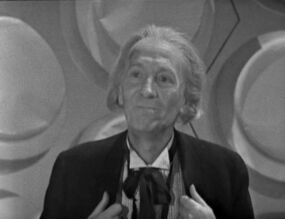
The Doctor and his companions next travelled into Earth's future; in London during the time of the 22nd century Dalek invasion, Susan met David Campbell, a young resistance fighter against the Daleks. Realising she would be better off not facing the dangers of travelling with him, and recognising she was no longer a child, the Doctor reluctantly left her behind. (TV: The Dalek Invasion of Earth) Although he later reunited with her briefly for an adventure on Gallifrey (TV: The Five Doctors), he continued to regret this decision for centuries to come (COMIC: The Forgotten) and even slept through a materialisation because of his sorrow (TV: The Rescue).
Ian came to believe that locking Susan out of the TARDIS was the bravest thing that he ever saw the Doctor do. (AUDIO: The Revenants)
Shortly after leaving Susan in the 22nd century, the Doctor travelled to Venus three billion years in the past to attend the funeral of his old friend Dharkhig. There, the Doctor, Ian and Barbara became embroiled in the Venusians' conflict with their would-be saviours, the Sou(ou)shi. (PROSE: Venusian Lullaby)
Intending to give Susan a wedding ring, the Doctor, Ian and Barbara visited the mines of Alexandria. However, Ian was separated from the Doctor and Barbara. Barbara accidentally created an alternative timeline after being sent 9 years into the past. In the alternate world, King Ptolemy and his warriors went to war with the alien Rhakotis, and Barbara soon fell in love with Ptolemy and married him, becoming Queen. After 9 years of war, the Doctor used a book from Gallifrey to repair time, erasing the alternative history and costing Barbara her husband. (PROSE: The Book of Shadows)
The Doctor briefly lost Ian and Barbara as companions when they decided to settle down in 1950s Shoreditch, and he spent four months investigating the stone of Micah in Scotland. Shortly after this, Ian and Barbara had found life in the 1950s difficult to relive and rejoined the Doctor aboard the TARDIS. (PROSE: Set in Stone)
Travelling on with his two human companions, the Doctor went on the trail of an energy being known as the Vril and followed it to 1553 England, where he, Ian and Barbara met Queen of England, Jane Grey. Defeating the Vril, who had possessed the Duke of Northumberland, the Doctor resisted the urge to alter Jane's fate, instead being by her side as she died. (PROSE: The Nine-Day Queen)
The Doctor had a second encounter with River Song during his travels with Ian and Barbara. River Song considered the First Doctor to be boring, because he spent his time hanging out with teachers. This time, River wiped his memory with mnemosine recall-wipe vapour so the timeline would remain intact. (GAME: The Eternity Clock)
Meeting Vicki
The Doctor gained a new companion in Vicki Pallister, who immediately became a surrogate for Susan. He faced Koquillion who turned out to be a murderer called Bennett but the Doctor defeated him. (TV: The Rescue)
Immediately following their departure from Dido, the TARDIS landed in 64 AD in the area just beyond the great metropolis Byzantium. Despite the Doctor's resignation at visiting the Roman empire, following some less than pleasant visits with Susan earlier on, the group made their way to the city. The Doctor seemed aware of the fact that Vicki would become Cressida later on. After a week in Byzantium, the group prepared to go back to the TARDIS, but were instead caught up in a large Jewish revolt in the market-square, separating them. At least two weeks passed before the group was brought together again, but then the TARDIS was missing, and the group joined a travelling caravan moving towards Rome, in hopes of finding the TARDIS along the way. (PROSE: Byzantium!)
Having found the TARDIS and spent several weeks relaxing at a nearby villa, the Doctor and Vicki decided to visit Rome. However, on the way the Doctor was mistaken for the famous lyre player Maximus Pettulian and was taken to meet Emperor Nero. After bluffing his way though a performance on the lyre the Doctor inadvertently became the inspiration for the Great Fire of Rome when the light reflected though his glasses caused some maps of the city to catch fire. Beating a hasty retreat from the city the Doctor and Vicki had no idea Ian and Barbara had also had their own adventure in Rome at the same time. (TV: The Romans)
The TARDIS next landed on Vortis in the Isop Galaxy. Having explored the planet and initially thought his TARDIS had disappeared, the Doctor and Ian encountered the Zarbi and were taken to the Carsinome city where they met the Animus. Having escaped the city the Doctor helped Barbara and a group of Menoptera defeat the Animus and free the mind controlled Zarbi. Having reunited the travellers left with the inhabitants promising they would always sing songs about their great deeds in saving their planet (TV: The Web Planet)
In China in the 19th century, the Doctor and his party discovered general unrest being put down by the ten tigers of Canton in the city of Guangzhou, and also met William "Bill" Chesterton, one of Ian's ancestors, who had been stationed there by the army. Together with the Tigers and the British militia, they foiled the plans of alien invaders, before once again leaving in the TARDIS. (PROSE: The Eleventh Tiger)
Next, the Doctor landed the TARDIS on Platform Five, a floating city above the planet Jobis. There, time travellers decided to spend some time relaxing. The Rocket Men, led by Ashman, attacked Platform Five. With the Doctor and Vicki captives, Ian managed to rescue Barbara and kill Ashman. (AUDIO: The Rocket Men)
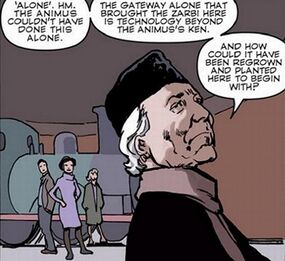
The Doctor, Ian, Barbara, and Vicki then travelled to 1868, where they attended a lecture by Thomas Huxley. The four of them travelled into the London Underground to investigate a group of missing students and discovered that the Zarbi had populated themselves in the there. Travelling further into the sewers, they found the Animus, who had reformed itself and had moved to Earth to take revenge on the human race. Ian was able to kill it by driving a train into it. The Doctor and his companions prepared to leave, but the Doctor discovered that his companions were missing; having been pulled out of time by an entity. (COMIC: Prisoners of Time)
The Doctor and his friends arrived on a planet in the distant past. There, they discovered a huge shining crystalline city. It soon became apparent that there were two species on this planet, beings of Light and beings of Dark, and their only desire was to see the total destruction of the other. (AUDIO: The Dark Planet)
The TARDIS arrived in the holy land in the 12th century. Just as the travellers exited the ship, a scuffle took place between a group of Saracens and a group including Richard the Lionheart. During this scuffle, Barbara was seized and kidnapped, and the remaining TARDIS crew helped the injured William de Tornebu back to meet the King at his castle in Jaffa. With Ian sent to search for Barbara, after being Knighted by Richard, the Doctor discovered the King wished to marry his sister Joanna to his enemy Saladin's brother Saphadin. However, Joanna was told of this arrangement and after a blazing row with her brother he accused the Doctor of revealing the secret. However, it was the Earl of Leicester who was indiscrete and having left Jaffa and reunited with their friends in the forest, the Doctor, Ian, Barbara and Vicki made their escape before the Earl could arrest them under suspicion of witchcraft. (TV: The Crusade)
The Doctor and his companions landed on Xeros, only to find their future selves exhibits in display cases. They began trying to avoid this version of the future. The Doctor was taken by the Moroks to be prepared for the exhibit but he was rescued by Ian. They were recaptured but the Xerons rebelled and freed them. Thus they prevented their own future. (TV: The Space Museum)
Their next adventure took the group to 1605 London, mere days away from the Gunpowder Plot. After encouraging Barbara and Ian to enjoy a showing of Shakespeare's plays at the Theatre, the Doctor took Vicki to the court of King James I, disguising the two as a priest of York and his young male ward. Following the Doctor's unravelling of the true mastermind of the plot, a young member of a secret society plotting for England to fall into darkness, the group left once more in the TARDIS, which was undergoing a lengthy exorcism, believed to be a temple of Satan. (PROSE: The Plotters)
Soon after, the Doctor and the rest of the TARDIS crew found themselves being followed through time by the Daleks, who built a time machine in order to follow the TARDIS through time. After many different trips and landings, the crew were able to defeat the Daleks. Following the encounter, the Doctor successfully programmed a Dalek time machine to take Ian and Barbara back home. (TV: The Chase) At this time he gained another new companion in Steven Taylor, and met another Time Lord, The Monk (TV: The Time Meddler)
The Doctor and his friends next visited planet Ca-Mon Green, where they ended a war between humanity and the Kel-T over the mining rights of a mysterious blue liquid that bestows superpowers. (PROSE: The Power Supply)
Troubled times ahead
The Doctor was pulled out of time by the Time Lords, who wanted his help in getting the Second and Third Doctor to work together to stop Omega. (TV: The Three Doctors)
His memories were wiped and he was returned to Steven and Vicki, who were discussing whether to operate the TARDIS in the Doctor's absence. After discovering a curious invitation on his person, the Doctor brought Vicki and Steven to Venice in 1606, where he met Galileo Galilei and fellow Time Lord, Braxiatel. (PROSE: The Empire of Glass)
From there, they arrived in England during the struggles of the Suffragettes, where an alien skull created havoc in its conquest to kill all males. Vicki and Steven became telepathically linked with the alien, and through this bond she was defeated. (AUDIO: The Suffering)
They arrived on a doomed planet with Drahvin and Rills. (TV: Galaxy 4)
The TARDIS crew helped a stranded Lapino, a member of a species that fed on emotions, gather enough emotional energy to send a message to his home planet. The Doctor first proposed to produce the emotion of love by creating an illusion for Vicki and Steven. The Lapino instead managed to produce a strong enough sense of guilt in the Doctor by reminding him of some previous events, in particular, the departure of Susan. (PROSE: Planet of the Bunnoids)
Vicki fell in love with a Trojan prince, and decided to leave the TARDIS to remain in Troy. It was in Troy where the Doctor and Steven met Katarina who decided to travel with them. (TV: The Myth Makers) Soon after, the Doctor entered into an epic struggle against the Daleks that saw the deaths of two of his companions, Katarina and Space Agent Sara Kingdom. The Doctor was also greatly aged by the Time Destructor, enough to turn a human to dust. (TV: The Daleks' Master Plan)
The Death Zone on Gallifrey
The uneasy relationship between the Doctor and Steven became more apparent from these events. The Doctor tried to look for ways of rectifying his relationship, such as visiting a rose garden, which led to the Doctor being taken by the Time scoop to the Death Zone. (PROSE: Roses, TV: The Five Doctors)
The Doctor elected to travel alone for a while before reuniting with Steven.
The Doctor began travelling on his own with the ability to pilot the TARDIS effectively, as a favour granted to him by Rassilon as he was approaching his first regeneration. He took this opportunity to revisit Rebecca Nurse, (PROSE: The Witch Hunters) and meets several future incarnations. (PROSE: Five Card Draw)
Visiting Cambridge, the Doctor visited a Time Lord called Professor Chronotis, unaware that the Professor had just had an adventure with his fourth incarnation. (COMIC: Cambridge Previsited)
The First Doctor teamed up with twelve of his future incarnations to save Gallifrey from destruction at the end of the Last Great Time War. Due to the timelines not being synchronised, he had no memory of this event. (TV: The Day of the Doctor)
John and Gillian
The Doctor, once again, took up residency in a junkyard in 1960s England. During that time, he made contact with his long-lost grandchildren, John and Gillian. When the TARDIS was transported to the 29th century, the Doctor and his grandchildren saved the peaceful Thains from being enslaved by the Kleptons. Declining the offer to become ruler of the Thain city, the Doctor set about trying to return his grandchildren home. (COMIC: The Klepton Parasites)
Trying to return them home, the Doctor crashed the TARDIS on an alien planet, where he and his grandchildren met Grig and accompanied him on a quest to find the oldest Therovian in existence who possessed a cure for a disease that had crippled the Theros population. After battling the Great Ixa, the Doctor and Grig found the cure, saving the Theros civilisation. (COMIC: The Therovian Quest)
Investigating the disappearance of seven Earth spaceships in 2075, the Doctor and his grandchildren were taken prisoner by Captain Anastas Thrax and his pirates, who had been drawing ships off course and selling their cargo. Alongside a band of prisoners, the Doctor overpowered Anasta's ship and had him arrested. (COMIC: The Hijackers of Thrax)
Taking his grandchildren to Vortis, the Doctor was attacked by the Zarbi and saved by the Menoptera, who asked him to investigate the Zarbi's strange new powers. They discovered a crashed spaceship and a slave camp of Menoptera's in the mountains. After being ambushed by Zarbi, the Doctor was held hostage and discovered the alien Skirkons were impersonating the Zarbi and using Glavinium X, the rarest mineral in the universe, to build bombs to engulf the universe. The Doctor was rescued by John and Gillian and destroyed the Glavinium X machine, freed the Menoptra slaves and defeated the Skirkons. Once again, the Doctor was hailed as a saviour amongst the Menoptra's. (COMIC: On the Web Planet)
Visiting another alien world, Gillian was kidnapped by the sphere-like Gyros. The Doctor tried to save her. But he and John were forced to retreat into the TARDIS, which was attacked and crashed underground. Aided by a group of tribesmen living in fear of the Gyros, the Doctor chased the Gyros to the Valley of Flames and stopped them from burning his granddaughter alive. Afterwards, he left the population to deal with the Gyros and whisked his grandchildren off to safety, away from the planet. (COMIC: The Gyros Injustice)
In the town of Hamelin, the Doctor, John and Gillian offered to save the children population from the Pied Piper. Exploring the Piper's castle, they fought off a dragon. After spending a night trapped in the castle, the Doctor confronted the Piper. the Piper told him that, if he wanted to save the children, he must pass three tests: The first test was to find the Pied Piper when he made himself invisible. Fortunately, the Doctor used his radar to detect the Piper. Secondly, the Doctor was tasked with floating down a window, which he did with a parachute. Lastly, the Doctor had to play a strange tune. Luckily, he played a tune which released the children from the castle, saving their lives. Afterwards, the Pied Piper's castle vanished. (COMIC: Challenge of the Piper)
The Doctor parked the TARDIS in Earth orbit on 20 July 1970, so that he and his grandchildren could watch the first manned flight to the moon. When the astronaurts fell through a crack in the moon’s crust into a deep chasm, the Doctor ventured onto the moon and used a blackboard to communite with the astronaurts in the vacuum. He told them to use the moon’s reduced gravity to jump out of the chasm, which result in them being freed. (COMIC Moon Landing)
The TARDIS materialised in London in 1966. There they encountered the Fulgurites, who were involved in the trafficking of humans across the galaxy for slave labour with the full knowledge of the British government. The Doctor and Steven put an end to the Fulgurites' activities with the assistance of a young city trader named Oliver Harper, who joined the TARDIS crew. (AUDIO: The Perpetual Bond, The Cold Equations) Oliver travelled with the Doctor and Steven briefly. He met his death at the hands of the Vardans on the asteroid Grace Alone while saving his companions' lives. (AUDIO: The First Wave)
Travels with Steven and Dodo
This added additional strain to his relationship with Steven, who briefly left the TARDIS following a subsequent bloody adventure. Steven almost immediately returned, however, when a girl named Dodo Chaplet forced her way into the TARDIS. (TV: The Massacre of St Bartholomew's Eve)
The TARDIS then took them to New York, where a cult had formed around six self-proclaimed "gods", who performed miracles on their followers. The Doctor's suspicion proved true, when the gods turned out to be alien lifeforms, who existed by belief and gained power equal to the faith the humans held in them. (PROSE: Salvation)
Together, they encountered humans from the far future as well as the Monoids, (TV: The Ark) the Celestial Toymaker, (TV: The Celestial Toymaker) and famous figures from the American Wild West such as Wyatt Earp and Doc Holliday. (TV: The Gunfighters) They travelled to Kiev in the 13th century. (PROSE: Bunker Soldiers)
They arrived on a planet where two very different peoples, the Elders and the Savages, shared a life. The Elders led a very civilised lifestyle, but their intelligence was gained by draining the life energy from the Savages. The Doctor stopped this cruel practice with the aid of a group of Savages, and left Steven behind to keep the peace between the two groups for the future. (TV: The Savages)
The Doctor began feeling unwell as his old body started wearing thin. The TARDIS landed in what appeared to be Paris just after the French Revolution, but history had been perversely warped. Dodo and the Doctor became separated, with Dodo being taken in by a travelling troupe of actors, and the Doctor being held prisoner in the Bastille. They discovered that the history in which they had landed was an altered history, made by aliens whose curiosity made them rewrite history to the designs of a depressed Marquis de Sade. After correcting history, Dodo and the Doctor left the alternate France behind. (PROSE: The Man in the Velvet Mask)
Soon after, the Doctor faced the mad computer WOTAN and its War Machines in London on 20 July 1966. After he was forced to leave an injured Dodo (who was controlled by WOTAN) on Earth, where he picked up the final companions of his first incarnation, Polly Wright and Ben Jackson. (TV: The War Machines) However, during this time, the Doctor tracked down the Blessing Star (PROSE: The Rag and Bone Man's Story), and met a writer called John Lucarotti, with whom the Doctor discussed his visit to Paris in the time of the Huguenots, suggesting Lucarotti to go to Samarkand. (PROSE: The Meeting)
In his investigation of reports of a series of agent provocateurs known as "the Doctor" who had been involved in numerous unusual incidents, the journalist James Stevens collected information about the WOTAN incident, which came known as the C-Day fiasco. He noted that, in his memoirs, Sir Charles Summer claimed that the public failed to realise the magnitude of the disaster which had been averted. He attributed the successful resolution of the crisis to "an aged but spritely scientist he knew only as 'the Doctor.'" Sir Charles described the Doctor as an English gentleman in his early sixties with "imperious white hair swept back from his face and reaching almost to collar length, with haughty features and piercing eyes that burned with intelligence and wit." Furthermore, he noted that the Doctor simply disappeared after the crisis had ended. Stevens found it bizarre that on the same day as the C-Day fiasco, another man who called himself "the Doctor" was involved in the investigation of a case of holiday fraud involving Chameleon Tours at Gatwick Airport. (PROSE: Who Killed Kennedy)
Final Adventures
Ben and Polly
The Doctor and his new friends then got caught up with a band of smugglers. (TV: The Smugglers) and continued to travel together, arriving on their first alien planet. (PROSE: Ten Little Aliens)
The Doctor, Ben and Polly later arrived in New York City in the 1890s where four Ovids - being of pure thoughts who travel from world to world in crystal spheres - had become trapped. Their presence caused people's dreams and nightmare to manifest in reality. The time travellers were able to free the Ovids with the assistance of Harry Houdini. (AUDIO: Smoke and Mirrors)
Nearing the End
Suffering from nightmares about his father, the Doctor awoke to find the TARDIS had been drawn to Gallifrey on the night he absconded with Susan. Roaming the deserted mountains, he encountered K'anpo Rimpoche, his old mentor, and was offered a chance to return to his life on Gallifrey before his departure, which would rewrite his own past and erasing his travels in time and space. Resisting temptation, the Doctor ran from Gallifrey once again, and continued "running" in his TARDIS. However, he now had the knowledge that his first regeneration was approaching. (PROSE: The Three Paths)
Death
With his ancient body wearing thin, the increasingly frail Doctor matched wits with the Cybermen on Antarctica in December 1986, an encounter which physically drained him.
He quickly returned to the TARDIS after having defeated the cyborgs, without pausing to wait for Ben and Polly, as he sensed his time was coming to an end. Entering the control room, he found the controls operating of their own accord and saw that the central column began to rise and fall. Ben and Polly, having caught up with him, were locked outside the TARDIS and banged on the doors in protest. He managed to open the doors with the last of his strength, before he collapsed from having lost the energy needed to keep his old body going. Before the astonished eyes of his companions, the Doctor regenerated for the first time, transforming into the younger Second Doctor. (TV: The Tenth Planet)
Undated adventures
- At some point, before meeting Vicki, the Doctor visited Dido. (TV: The Rescue)
- The First Doctor visited Mondas. (PROSE: Byzantium!)
- The First Doctor attended the funeral of Alistair Gordon Lethbridge-Stewart, as did his 12 future incarnations. (PROSE: The Gift)
- Before he met Ian and Barbara, the Doctor argued with Henry VIII and was sent to the Tower of London, where he could escape in the TARDIS. (TV: Strangers in Space)
Alternative timelines
- In an alternate timeline created by the Black Guardian as revenge on the Doctor, the First Doctor never left Gallifrey, and eventually became Lord President. However, it also left Earth to be invaded by countless aliens, who were then in war over the planet. The Seventh Doctor, Benny, and Ace, with instructions from the White Guardian, were able to retrieve the Key to Time to set the timeline straight. (COMIC: Time & Time Again)
Psychological profile
Personality
The Doctor was adamant that he and Susan would one day return to Gallifrey. He saw himself as an exile, "without friends or protection", as he put it. The Doctor initially showed a very gruff and stubborn personality. When he first met Ian and Barbara, he abducted them and set the TARDIS console to shock Ian into unconsciousness. He justified this by claiming he was keeping himself and Susan safe. He regarded humans as primitives and, arguably, even contemplated killing the mortally wounded Za so that he would not slow down the Doctor's party. When Ian caught him apparently ready to bludgeon the man with a rock, the Doctor explained he merely wanted Za to draw him a map. However, this explanation seemed somewhat improvised. Despite Ian's apparent hostility towards him, the Doctor was quick to bargain for his safety. (TV: An Unearthly Child) He seriously suggested that, faced with a bandit raid, he and his companions, along with Tegana, should leave in the TARDIS and leave the rest to perish. (TV: Marco Polo)
The Doctor was frequently sarcastic towards those around him, seemingly to elevate himself above lesser intellects. (TV: The Time Meddler, The Chase) He once stated his belief that there was a reason for everything in the universe and claimed to have "the directional instinct of a homing pigeon". (TV: The Chase)
The Doctor was quick to help the Rills in their fight against the Drahvins on a doomed planet, noting that bias based on appearance was unwelcome however he allowed the Drahvins to die when the planet exploded. (TV: Galaxy 4) Upon witnessing the persecution of the so-called "savages", the Doctor was quick to ally himself with them against the Elders. He defied their suggestions that progress was based on exploitation, branding it murder. Despite this, the Elders recognised him as a man of infinite wisdom. (TV: The Savages)
He negotiated the release of the Monk from the Daleks, despite peace not being brokered between the two Time Lords, and could not explain his motives for having done so. (TV: The Daleks' Master Plan) Sometimes the Doctor’s hostility would be turned towards his own companions. After the TARDIS became faulty, the Doctor took Ian and Barbara to be saboteurs and accused them as such. They refuted his claim but he insisted they were trying to blackmail him into returning them home. Barbara confronted him, saying "gratitude is the last thing you'll ever have or any sort of common sense either". When proven wrong, the Doctor apologised and spent some time trying to win Barbara over. (TV: The Edge of Destruction)
As the incarnation progressed, however he began to thaw and help people, albeit reluctantly at times. Despite the Doctor deliberately removing the TARDIS' fluid link so that he would have an excuse to explore the Dalek City on Skaro, he soon showed his protective side when he went so far as to offer the Daleks the secrets of the TARDIS in return for Susan's safety and took it upon himself to ensure the Thals were not threatened with extinction. (TV: The Daleks) The Twelfth Doctor later opined that this experience shaped his identity for the better. (TV: Into the Dalek) The Doctor was quick to comfort Vicki when she expected him to abandon her. Despite his earlier lectures against altering history, he used first aid - including drugs - upon the injured de Tornebu. He proceeded to justify stealing clothes based on the fact they were already stolen and found his shoplifting abilities hilarious. Although he knew that it wouldn't work, the Doctor tried to convince King Richard to carry out his peace plan. (TV: The Crusade)
Together with Vicki, he admitted that he would miss Ian and Barbara after they had left. (TV: The Chase) He would get particularly snappish with those who doubted the TARDIS could actually travel through space and time. (TV: An Unearthly Child, The Time Meddler)
While his relationship with Vicki remained warm, the Doctor's relationship with Steven tended to be stressed at times. After Vicki's departure, a young woman from Troy named Katarina joined the Doctor and Steven. (TV: The Myth Makers)
On Marinus, he belatedly only agreed to help Arbitan restore the Conscience of Marinus after he was blackmailed. Despite earlier claims that he never gave advice, the Doctor took Sabetha aside and told her only man could preserve justice, and therefore could never be ruled by machines. (TV: The Keys of Marinus)
One trait that continued with the Doctor throughout his first incarnation was his belief in not meddling with historical events. The Doctor came to the defence of established history when Barbara attempted to alter the nature of the Aztec civilisation. Nevertheless, he was not averse to having a personal relationship with one of its respected female elders. (TV: The Aztecs) When he met the Monk, the Doctor quickly labelled him a "time meddler" and continued to uphold his belief that history could not be changed. (TV: The Time Meddler)
In Paris on 24 August 1572, the Doctor again backed up his previous ideal (TV: The Aztecs) that it was permissible to save people who were not directly contributing to historical events. (TV: The Massacre of St Bartholomew's Eve)
Whilst normally peaceful, the Doctor would, when pressed, resort to hand-to-hand combat with an effectiveness which belied his age. (TV: The Romans, The Crusade, The Chase, The Daleks' Master Plan) A professional wrestler, the Mountain Mauler of Montana, had taught him some effective moves. (PROSE: Byzantium!, TV: The Romans)
At other times, however, the Doctor revealed age-related vulnerabilities. For example, he suffered from rheumatism that flared up if he was exposed to cold. (TV: The Space Museum) He once refused to bend his knee to the Kublai Khan, giving rheumatic knees as his excuse. (TV: Marco Polo)
The Doctor did not associate himself with a specific culture. When a policeman asked if he was British, he replied:
I am a citizen of the universe, and a gentleman to boot!
Susan once described her grandfather as being a "great man". (AUDIO: Domain of the Voord)
He considered himself to be very dangerous when roused. (AUDIO: The Doctor's Tale)
In 1400, Geoffrey Chaucer described the Doctor as being "a man of rare wit and temper, a philosopher."
Several of his future incarnations had a noticeably profound respect for the first incarnation, so much so that they dared not question his judgment. The Time Lords used this to their advantage when the second and third incarnations were found to be incapable of working together. (TV: The Three Doctors)
In another meeting, the Doctor again showed his position of authority over his future selves by deducing the truth about Rassilon's gift of immortality before the others and taking action without their input or objections. (TV: The Five Doctors)
Habits and quirks
This incarnation of the Doctor punctuated his speech with, "Hmmmm...?", exasperated sighs and snorts and the occasional mangled phrase or word. He would address young women as "child" and younger men as "my boy", or in Ian's case by his name. However, he found it difficult, or pretended to find it difficult, to remember Ian's surname. He later used Ian's surname - or a variant of it - frequently when addressing him. (TV: The Keys of Marinus) The TARDIS required expert piloting and guidance by the Doctor. Its systems often broke down, including the navigational systems. This, combined with the fact the TARDIS was designed for six pilots, (TV: Journey's End) would explain the difficulty the Doctor encountered in returning Ian and Barbara to their lives in 1963 London.
The Doctor never even hinted at the nature of his own origins, other than to state that he and the Monk originated on the same world and to hint that Susan and himself were exiles from the same place and time. (TV: An Unearthly Child) Later incarnations would reveal that his home planet was Gallifrey, possibly signifying that the Monk and Susan were from there too. (TV: The War Games, Colony in Space, The Three Doctors, et al)
Mysteries and discrepancies
- One account explains that the Doctor rescued Larna, a young Time Lady from the Doctor's own time, whom he later called Susan. (PROSE: Birth of a Renegade) Whilst another account states that the Doctor had gone back in time to the Dark Times of Gallifrey to pick up both the Other's granddaughter and the Hand of Omega from that time period. (PROSE: Lungbarrow) Statements made by his later incarnations following the Last Great Time War, however, seem to imply that he was once a father and a grandfather. (TV: The Empty Child, Fear Her, The Doctor's Daughter, Night Terrors)
- This incarnation of the Doctor seemed unfamiliar with the Daleks, and demonstrated eagerness to explore their homeworld Skaro. (TV: The Daleks) However, the Eleventh Doctor revealed that as a child, he was fond of a children's story called The Emperor Dalek's New Clothes, among others. (TV: Night Terrors)
Other matters
- This Doctor was one of only two incarnations ever known to smoke, (TV: An Unearthly Child) the other being the Eighth Doctor, although this only took place when the Doctor's mind and personality were briefly 'mixed up' with traits from his companion Fitz Kreiner. (PROSE: Halflife)
- When the Doctor, Vicki Pallister, Barbara Wright and Ian Chesterton were being chased by the Daleks through time, he claimed to have built the TARDIS. (TV: The Chase) On the face if it, this statement appears to be in contrast with later incarnations and Time Lord authorities who claimed that the TARDIS was "borrowed"/"stolen", (PROSE: The Gallifrey Chronicles, TV: Planet of the Dead) an account the TARDIS itself agreed with. (TV: The Doctor's Wife) It has also been suggested that the TARDIS was better described as having been "grown", rather than "built". (TV: Rise of the Cybermen, The Impossible Planet)
- Additionally, Susan had made the claim that she coined the acronym TARDIS, (TV: An Unearthly Child) implying that the Doctor may have been somehow involved with the development of the TARDIS. The eighth incarnation revealed that he had made various additions to the TARDIS to replace the need for a direct symbiotic link to control the TARDIS and thus make it harder for the Time Lords to find him, suggesting that, while the Doctor did not build the TARDIS from the beginning, he made significant alterations to it after it came into his possession. (PROSE: The Taking of Planet 5)
- The matter of this incarnation's age and how long this incarnation lived was unclear, although Susan once called him an adolescent by Time Lord standards; (AUDIO: Here There Be Monsters) shortly after his regeneration, his next incarnation stated that he was around 450 years old. (TV: The Tomb of the Cybermen)
- See separate article.
- Technically, this Doctor's first known encounter with the Cybermen took place on the Death Zone on Gallifrey, where he encountered a small group of them in the tower. (TV: The Five Doctors)
Appearance
In his youth, the Doctor had short, dark hair (TV: Listen), though in his later life, he had shoulder length, greyish-white hair. He had piercing blue eyes. The Doctor affected a slightly eccentric Edwardian dress sense, wearing a frock coat and tartan trousers. Occasionally he wore an Astrakhan (TV: An Unearthly Child, The Tenth Planet) or a Panama hat. (TV: The Chase, The Daleks' Master Plan) He sometimes wore a cape. (TV: Planet of Giants, The War Machines) He also used a smoking pipe on at least one occasion. (TV: An Unearthly Child)
Like his fifth incarnation, he sometimes used half-moon reading glasses, (TV: The Time Meddler, The Daleks' Master Plan, The War Machines) although a later incarnation would call into question whether he actually needed them. (TV: Time Crash) He occasionally employed a walking stick (TV: The Five Doctors) made of ebony (PROSE: Nothing at the End of the Lane) which sometimes made an effective weapon. (TV: The Rescue, The Chase) He wore a blue signet ring which had special, if ill-defined, powers. (TV: The Web Planet, The Daleks' Master Plan, The Power of the Daleks) On one occasion, the ring appeared to both facilitate hypnotism and protect the Doctor from electrical shock as well as to unlock the door of the TARDIS. (TV: The War Machines, The Daleks' Mater Plan) On occasions, he did not wear his ring, and wore fingerless gloves on his hands. (TV: The Five Doctors "The Tenth Planet (TV story))
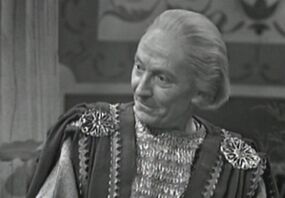
When adventuring in Earth's past, this incarnation of the Doctor, in contrast with most that followed, sometimes made significant changes to his wardrobe in an attempt to blend in with the local population. (TV: The Romans, The Reign of Terror, The Crusade) He usually made at least a token alteration to his "standard" outfit wherever he went in Earth's past, as when he wore a cowboy hat in 19th century Arizona. (TV: The Gunfighters) More rarely, he would gladly accept the vestments of extraterrestrial societies, as when he proudly wore the ceremonial garb of the Elders. (TV: The Savages)
Behind the scenes
The Brilliant Book 2011
According to The Brilliant Book 2011, a non-narrative based book, the First Doctor met Winston Churchill in 1911, stepping out of the TARDIS to tell Churchill it was an honour to meet him. When Churchill informed the Doctor they had met before, the Doctor chuckled and said, "That's the trouble with time travel".
Casting
Actors considered for the role of "Doctor Who", as he was then known, included Geoffrey Bayldon [1], Cyril Cusack[2], Hugh David[3] and Leslie French.[4] (Bayldon would later play an alternate version of the First Doctor in two Unbound adventures for Big Finish Productions: NOTDWU: Auld Mortality and NOTDWU: A Storm of Angels.) William Hartnell had, up until that point, mainly played small-time thugs and other unsympathetic parts in crime films and humourless military men in comedies. Producer Verity Lambert was inspired to ask him to accept the role after seeing him in his well-known role in This Sporting Life, which convinced her that he could play a tough, yet shaded and sympathetic character.
When the time came for the First Doctor to appear in the 1983 Children in Need anniversary special TV: The Five Doctors, actor Richard Hurndall was hired to play the role, standing in for William Hartnell, who had died in the mid-1970s. A clip of Hartnell as the Doctor from The Dalek Invasion of Earth preceded the opening titles, and Hartnell's name appeared amongst those of his fellow Doctors in the end credits. During the 50th anniversary in 2013, Hartnell appeared in TV: The Name of the Doctor by way of manipulated stock footage and audio, allowing the actor to posthumously share dialogue with Jenna-Louise Coleman playing a "splinter" of Clara Oswald; later in 2013, Hartnell was again represented via stock footage in TV: The Day of the Doctor, but with John Guilor providing newly recorded dialogue.
William Russell voiced the First Doctor for the Big Finish Doctor Who audio story The Light at the End.
whoisdoctorwho.co.uk
The website whoisdoctorwho.co.uk had a list of sightings of the Doctor from which people had ostensibly been submitting to Clive, a conspiracy theorist character from TV: Rose.
A submission from an 81-year-old Mrs. Smith mentions her working as an usherette at the Ritz Cinema in Totter's Lane, which was later demolished and turned into flats. In 1963, she encountered a version of the Doctor with white hair, and a younger girl Mrs. Smith presumed was his granddaughter. While watching a film on the fall of Rome at the cinema, she recalled the Doctor continuously tutting and muttering that it wasn't historically accurate. She "gave him a piece of [her] mind and sent him packing". He stormed towards the old junkyard and she never saw from him again. She presumed Clive's Doctor posted on the website, the Ninth Doctor, was some sort of relation, rather than another incarnation like the first. [5]
Footnotes
- ↑ Geoffrey Bayldon: Pop goes the Weazle. Total Sci-Fi Online (2010).
- ↑ The Changing Face of Doctor Who. BBC Archive, Nearly Who, page 2. BBC.
- ↑ The Changing Face of Doctor Who. BBC Archive, Nearly Who, page 1. BBC.
- ↑ Silver Nemesis. Doctor Who Classic Episode Guide. BBC (2003).
- ↑ Contact Us. whoisdoctorwho.co.uk. Retrieved on 23 July 2013.
| ||||||||||||||||||||||||||||||||||||

